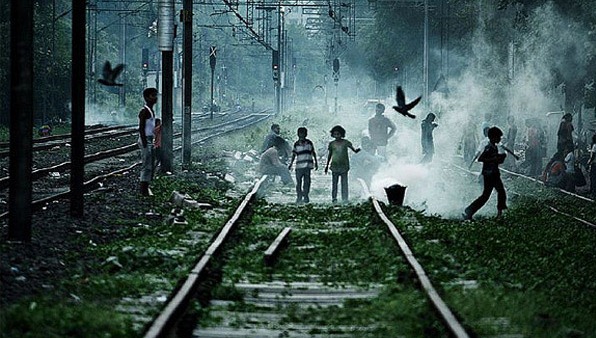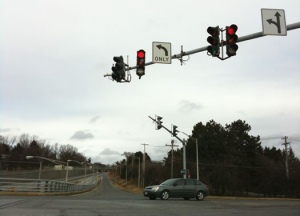Talking about a perfect world at the coffee table, several years ago, a good friend shared this with me and asked what would I do in that situation. Today, I would like to share the situation here and ask the same question to you.

Consider a group of children playing near two railway tracks, one still in use while the other disused (for unknown reasons). Only one child is playing on the disused track while the rest are all excited and busy playing on the track that was in use. Suddenly you notice that the train is coming, and you are just beside the track interchange.
You have the ability to make a quick decision. Would you make the train change its course to the disused track and save most of the children's lives sacrificing the one child playing by that disused track? Or, would you let the train go on it's usual track ?
The answer to this question can go in many directions and I look forward to your responses.
Just because you go by the rules and do everything that you are supposed to do, it doesn't guarantee convenience and safety like the one little kid who is now on your mercy even though he is playing on that disused track going by rules. But, does it mean we should just do what everybody else is doing paying less attention to rules?
Here is another story on the similar lines (actually it happened recently) :
 I was standing outside at an intersection where a gentleman was waiting in his car for green signal. Here in US, I believe there are sensors at the intersections and lights turn green if a car standing is sensed (especially during the nights). Well, may be the sensors were not working or may be this car was not in the right spot.
I was standing outside at an intersection where a gentleman was waiting in his car for green signal. Here in US, I believe there are sensors at the intersections and lights turn green if a car standing is sensed (especially during the nights). Well, may be the sensors were not working or may be this car was not in the right spot.
Several minutes passed by, all other lights were turning green, yellow and red except for this one side where this car was waiting.
I got curious to see what finally happens here. A few more minutes go by and this car is still waiting…..
Finally this car driver decided to cross the road anyway and drove right into the intersection while signal was still red for him. He was on his way…
The signals at the intersections are designed to make our life safer and convenient. But if there is no assistance available and the lights are not working for some reason, he had a choice: to take a detour of about 2 miles, or to jump the signal. He chose to jump!
Your Thoughts?
Both these stories are thought provoking and I am sure you have some thoughts. What would you do in both these situations? Please share your thoughts now in the comments…





The first story is very thought provoking. But this reminds me of what John Maxwell wrote in his “Leadership Gold” book. He said, “Leaders take the decisions long before the time for action arrives.”
From that angle, I would try to get the children way from the operational track for sure. But the train should go on its course. It’s interesting how many angle come to mind when I think of the possible “best” solution.
I think the rules are written for helping us help ourselves and others live a better life. Taking a clue from the story of Chad Hymas from his book, “Doing What Must Be Done”, the decison making on the second story becomes very easy.
One mistake, and a fatal accident can turn our lives upside down. Therefore, I think I would have preferred to take the detour rather than driving on a red signal because I believe my life has bigger purpose than saving 2 miles of driving time. That way, I not only set a good example for others watching me do that, I ensure my safety too.
Yes brother! You have that clarity in thinking and I always admire you for that.
FIRST things first. Let’s get to your opening question… “Following Rules — Does It Always Produce A Pleasant Experience?There are many things in life that are not pleasant. Perhaps you need to ingest some “yucky”medicine to get better… perhaps the discipline being imposed on you is unpleasant but necessary to teach you an important life lesson. There are many “unwritten” rules that we adopt from a young age and incorporate into our lives.On the surface. some of them may seem unpleasant, but underpinning them is the necessity of a better life.How one distinguishes between ‘pleasant’ and ‘unpleasant’ is a matter of attitude and personal taste. Some people live by the idea that ‘Rules are meant to be broken’ but with that negative mindset, the only thing broken is the respect and trust that could have been earned.SECONDLY, I remember many lengthy discussions on the topic of ETHICS with similar difficult decisions.There is not enough information in this scenario to make an informed decision… we don’t know how far off the train is… the train should not be speeding through an area where children are at play… but IF something like this happened in reality, one would likely act on instinct and preserve as much life as possible.
Call me “the eternal optimist” if you like, but perhaps the child on the unused tracks is within reach of the rail switching device and can also be saved. Quick instructions to run to the other tracks may even be sufficient.
THIRD, the reason ethical questions are important to consider is because it helps prepare us for the unexpected. If there has been some previous resolution in our minds as to how we would handle a situation, then it actually occurs, this foreknowledge will avert a sense of bewilderment.
Her’s a RULE to remember: Reasonably Usable Life Experience
“Reasonably Usable Life Experience” – That is an awesome RULE, Bill. Thank you!
I agree, there are details about the scenario not available to really pin point the exact scenario when it comes to how far the train is, at what speed is it, is it a cargo train or passenger train etc… But I believe the intent of the description is to create a critical decision point in the mind of the reader where a quick decision needs to be taken.
But this is what makes it fun, isn’t it? This is just another instance where we need to make a decision without having complete data 🙂
You’re welcome Kumar. Just imagine if a computer programmer could program morality. Now there’s a project for you!
My views would be that people must follow the rules as rules are placed to discipline the people mainly because there are good people as well as bad people in this earth. In first part of the story, I could find 3 situations wherein a decision needs to be taken immediately. 3-situations from my views are (i). Many children playing in “still use track” . (ii). A child playing in “disuse” track. and (iii). diversion of train to old tracks which could also be risky to thousand of people boarding the train. So first thing would be that I think the concerned railway ministry must clear off all old tracks and not allow any children play in such areas. Children must be made aware and slowly teach them what is good and what is bad..
So for me, I would never let the train go off track. Secondly, I would firstly chase off all the children playing in “in use” track and let a single child play in the old track.
Good thoughts Sir! Like I said, we can come up with different solutions and isn’t it fun to think so many creative ways to resolve this problem when really the details are not clear? 🙂
Enjoyed reading your comments. Thank you!
Interesting, Kumar. To be completely honest, my first reaction the first story is to choose neither track but to think about a 3rd solution that could save all the kids, such as stopping the train. Since we’re talking about breaking rules and thinking outside the box, why not? As for your second story, I’ve been in that exact situation before myself. Sat at a left turn lane where the light was clearly broken. So, I found a way to safely get to the right turn lane, turned right and made a u-turn to where I needed to go. It was bending the rules some without breaking them entirely. I guess what I’m trying to say is that it really depends on the situation. But, while we should generally follow rules for the sake of keeping us all safe, we can’t be afraid to bend them, go around them, if need be. We have a mind to use for a reason. 🙂
Thank you Dr.Chan. Appreciate you taking time to share your thoughts. Sometimes situations like the “red signal not turning green” can be frustrating. But I would tend to think the same way. It is easy to break the rules but it’s “the right thing to do” to not break them :-).
Thanks again!
When It comes to decision, people afraid. No matter- It is Right OR Wrong. Both Stories are not only a decision point but also an exam to clarify our Leadership skills. We should always keep in our mind one thing- How can we reduce the dangerous effect on living and non-living things while we are going to take decision. A true leader thinks for everybody NOT for few because Leader have a GLOBAL meaning itself. No decisions are BAD only RESULTS.
I like that, Rishabh. “No decisions are bad, only results”. Well, and to add to that, results are not in our hands, we can only take action.
Thanks for sharing some thoughts. Appreciate that!